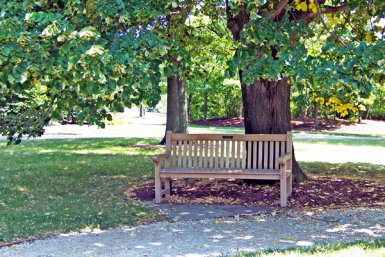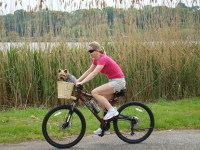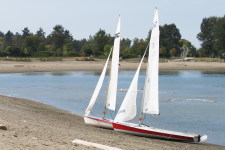Lesson 5 - Present Tense
Introduction
This lesson introduces the present tense of English verbs. The present tense of the very common irregular verb have is also shown. This lesson also introduces the English words for colours. Flashcards are included to help you learn these very common words.
A short conversation is included to help you learn how to speak English in everyday situations.
Conversations

English
Ashley and Eric are sitting on a bench in a park enjoying a warm summer day.
Eric: What a beautiful day!
Ashley: Yes. I can't believe how warm it is.
Eric: Look at all the people walking around the park.
Ashley: I hear that it is going to rain tomorrow, so people are taking advantage of the nice weather.
Eric: Well, as much as I enjoy sitting in the sunshine, I am getting very hungry.
Ashley: You're not the only one. Let's go.
Eric and Ashley stand up and walk towards the restaurant.
Vocabulary and Phrases
 to sit
to sit
|
|
 park
park
|
|
 to enjoy
to enjoy
|
|
 warm
warm
|
|
 summer
summer
|
|
 What a beautiful day!
What a beautiful day!
|
|
 I can't believe
I can't believe
|
|
 to walk
to walk
|
|
 It is going to rain tomorrow.
It is going to rain tomorrow.
|
|
 sunshine
sunshine
|
|
 tomorrow
tomorrow
|
|
 to take advantage of
to take advantage of
|
|
 weather
weather
|
|
 I am getting very hungry.
I am getting very hungry.
|
|
 Let's go.
Let's go.
|
|
 restaurant
restaurant
|
Advertisement
Colours
Note: colour (UK spelling), color (US spelling).
 Yellow
Yellow
 Blue
Blue
 Navy Blue
Navy Blue
 White
White
 Grey
Grey
 Brown
Brown
 Orange
Orange
 Black
Black
 Purple
Purple
 Red
Red
 Pink
Pink
 Green
Green
 Light Green
Light Green
 Magenta
Magenta
 Cyan
Cyan
Grammar
Verbs - Present Tense
A verb is a word that expresses an action, a condition or a state of being. Verbs have different forms to indicate if the action happened in the past, is currently happening, or will happen in the future. The present tense of a verb is used to indicate that an action, condition or state is:
- currently happening
- a general fact or truth
- habitual, everyday, or expected to continue for an unknown amount of time into the future.
To Walk
 I walk
I walk
|
|
 you walk
you walk
|
|
 he walks
he walks
|
|
 she walks
she walks
|
|
 it walks
it walks
|
|
 we walk
we walk
|
|
 they walk
they walk
|

Examples
 I see the cup.
I see the cup.
|
|
 She reads the book.
She reads the book.
|
|
 They think he is wrong.
They think he is wrong.
|
|
 We believe you.
We believe you.
|
|
 He sings a song.
He sings a song.
|


Verbs - Present Progressive Tense
In English there is also the present progressive tense, also called the present continuous, to indicate that an action is happening in the present. This is is used to emphasize that an action is happening right at this moment, or is happening now but only for a short amount of time.
The present progressive tense is formed using to be with the verb, and adding ing to the end of the verb. For example I am walking. Contractions are often used in this case. For example I'm walking.
 I am walking
I am walking
|
|
 you are walking
you are walking
|
|
 he is walking
he is walking
|
|
 she is walking
she is walking
|
|
 it is walking
it is walking
|
|
 we are walking
we are walking
|
|
 they are walking
they are walking
|
Examples
 I'm walking to the store.
I'm walking to the store.
|
|
 He's opening the door.
He's opening the door.
|
|
 It's raining.
It's raining.
|
|
 We're waiting for you.
We're waiting for you.
|


To Have
Have is a very common verb that is irregular in the present tense. The following table shows the forms of have in the present tense.
 I have
I have
|
|
 you have
you have
|
|
 he has
he has
|
|
 she has
she has
|
|
 it has
it has
|
|
 we have
we have
|
|
 they have
they have
|
Examples
 I have an apple.
I have an apple.
|
|
 She has black shoes.
She has black shoes.
|
|
 We have a new table.
We have a new table.
|
|
 You have a nice house.
You have a nice house.
|
|
 He has a blue car.
He has a blue car.
|
|
 They have a grey cat.
They have a grey cat.
|


Advertisement
Reading English
The day is warm and sunny. The sky is blue with a few white clouds. Mark walks along the shore, looking at the waves on the ocean and the boats in the distance. He hears people laughing. He turns to look and sees a family walking a black dog. Mark waves at the family, then walks towards a café he sees in the distance. He climbs up some stairs and walks along the grey sidewalk until he reaches the café. He enters the café and walks up to the counter.
"What would you like?", asks a lady with long, brown hair.
"How much are the muffins?", Mark asks.
"Two dollars and fifteen cents," she replies.
"A blueberry muffin and a large coffee please."
"That's four dollars and twenty cents," she says as she pours the coffee.
Mark pays the lady, then brings his coffee and muffin to a table outside. He takes a sip of his coffee as he looks at the ocean.
English Vocabulary
| day | |
| sunny | |
| cloud | |
| sky | |
| wave | |
| ocean | |
| distance | |
| hears | |
| turns | |
| sees | |
| family | |
| waves | |
| climbs |
| sidewalk | |
| reaches | |
| enters | |
| What would you like? | |
| asks | |
| hair | |
| replies | |
| says | |
| pours | |
| pays | |
| brings | |
| table |
Flashcards
Here are some flashcards to help you learn the English words for some common colours.
Practice
Play the audio, then write the English word or sentence that you hear. Press the Check button to see if your answers are correct.

|
|

|
|

|
|

|
|

|
|

|
|

|
|

|
|

|
|

|
Quiz
Here is an online quiz to help you learn the English vocabulary introduced in this lesson.

